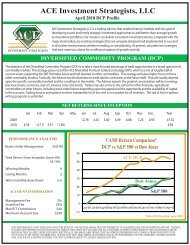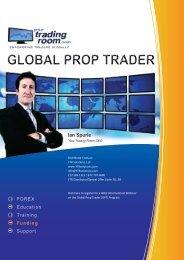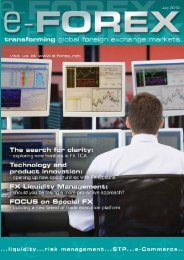Create successful ePaper yourself
Turn your PDF publications into a flip-book with our unique Google optimized e-Paper software.
Technology upgrades<br />
CME Group invests heavily in enhancing its<br />
infrastructure and speed of its matching engine. A<br />
number of technology upgrades during the past year<br />
has seen the matching speed on the exchange’s<br />
electronic trading platform, Globex, change from 12<br />
milliseconds for FX down to around 2.5 milliseconds.<br />
Says Sammann: “We think this is a significant<br />
increase in speed and efficiency and for our market<br />
participants, where speed is important and latency<br />
concerns abound, we continue to invest in our<br />
infrastructure across all asset classes.”<br />
In addition to this is the increasing rollout of CME<br />
Group’s co-location facility to provide a service to<br />
enable high-velocity trading customers to co-locate<br />
their application server alongside the Globex<br />
matching engine.<br />
According to Sammann, another benefit to our<br />
customers that trade cash and futures is that CME has<br />
reduced the EFP (exchange-for-physicals) fee, for<br />
firms to take an OTC position and migrate that onto<br />
an exchange-listed futures position, to give customers<br />
a 43 per cent saving. He says: “This makes it easier<br />
and more cost effective for firms that want to take<br />
advantage of our central counterparty clearing service<br />
and apply that to their cash positions, and as a result<br />
Derek Sammann<br />
“Our non-institutional customers indicated a need for smaller<br />
contracts to more easily access the FX market..”<br />
>>><br />
EFP volumes have increased by 25% in the last<br />
quarter. Customers, particularly in the last 12<br />
months, have started to see the significant benefit of a<br />
clearing element in their FX transactions.”<br />
The recent crisis has prompted a flight to quality, with<br />
concerns for risk reduction and the deleveraging of both<br />
banks and buy-side trading books, and the increased<br />
redemptions of hedge funds means that customers are<br />
looking to go back to basics in risk management.<br />
Sammann says: “This has been reflected not only in a<br />
reduction of emerging markets business but also the<br />
options volume has pulled back a little more<br />
dramatically than the spot and the futures business.<br />
This speaks of a simpler view of risk, and customers<br />
are moving away from <strong>com</strong>plexity and are drawn to<br />
liquidity. By offering liquidity, transparency, and<br />
credit risk mitigation, we provide our customers with<br />
the solutions they need to manage their risk.”<br />
He adds that best performing currencies through the<br />
crisis were the high yielding currency pairs of the<br />
British pound, Canadian dollar and Australian dollar.<br />
ICE<br />
Ray McKenzie, vice president of US Futures Product<br />
Sales at the InterContinental Exchange (ICE) says the<br />
exchange has recently launched block trade<br />
capabilities for its FX futures contracts, and a Trade at<br />
Settlement (TAS) facility for the ICE US dollar index.<br />
The TAS capability allows a trader to enter an order<br />
to buy or sell an eligible futures contract month<br />
january 2010 e-FOREX | 43










